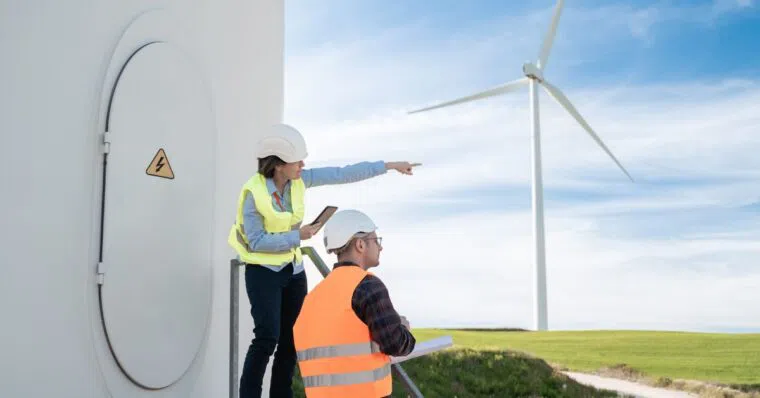How to Get Started with the Best Sustainable Career Pathways in 2023

The 2022 State of the Profession report by Greenbiz revealed a benchmarking study that examined the changes in the U.S. sustainability job market. According to the research, the average salary is $146,900 for sustainability managers, $227,158 for directors, and an outstanding $404,972 for vice presidents. It’s clear that more and more companies are shifting to sustainable business practices. And, these salaries reflect the historic corporate transition that the private sector is undergoing. As these figures demonstrate, it is the right time for professionals to embrace sustainable career pathways. And, build the necessary skills and knowledge to lead worldwide sustainability initiatives in their organizations.
Why Work in Sustainability
Sustainability career pathways open up a number of job opportunities across various roles. This includes sustainability specialists, environmental engineers, sustainability managers, and sustainability directors. These employment opportunities give professionals the chance to create a positive impact on the environment, people’s quality of life, and future generations. Anyone who is passionate about protecting the environment, concerned about the climate crises taking place around the world, and interested in creating a greener, safer future should consider a career in sustainability.
Required Skills for Sustainability
To make an impact and drive real change, sustainability professionals need to develop skills. These skills will allow them to do more than just cross things off of their daily to-do lists. Here are some key skills that are imperative to thrive in this field:
Essential Skills for Sustainability Professionals
- Systems analysis: Understanding how a system should operate and how modifications to the system can alter outcomes
- System Evaluation: Identifying system performance indicators and the actions necessary to enhance the performance
- Operations Research: Analyzing key requirements and understanding essential product features to develop a sustainable product design
- Data Analysis: Developing the expertise in analyzing large amounts of raw data and drawing meaningful insights
- Project Management: Planning, organizing, and executing complex sustainability projects effectively
General Skills for Sustainability Professionals
- Collaboration: Working with people from different sectors and working effectively as part of a team
- Creativity: Finding new, innovative, and out-of-the-box solutions to sustainability problems
- Decision-Making: Making crucial decisions on critical environmental, social, and economic issues in order to determine the key focus areas that require immediate attention
- Communication: Being able to clearly explain complex sustainability concepts to various stakeholders, including board members, commercial managers, engineers, designers, and project managers
- Pragmatism: Understanding which sustainable solutions can be practically applied to real-world problems to fulfill sustainability goals
How Can You Start a Career in Sustainability
Now that you know the skills needed to pursue a career in sustainability, let’s look at some of the effective sustainable career pathways you may take to enter this field.
1. Volunteering
One of the easiest ways to get started in sustainability is to volunteer with a local organization that prioritizes sustainable goals and implements them in its workflow. This will allow you to gain hands-on experience and learn more about the field.
2. Education
An Associate, Bachelor’s, Master’s, or Doctoral Degrees in Sustainability or a related discipline is an effective educational route for aspirants to establish a career in this field. An Associate’s Degree in Sustainability will qualify you for some positions; however, managerial roles demand higher qualifications such as bachelor’s or master’s degrees.
3. Internships
Internships are a great way to gain practical experience and make connections in the sustainability field. When it comes to internships in sustainability careers, many organizations offer roles in their corporate social responsibility (CSR) and Environmental, Social, and Governance (ESG) teams.
4. Networking
Building relationships with professionals in the sustainability field can be a valuable way to learn more about the industry and potentially land a job. Attend conferences, join relevant professional organizations, and seek out mentors who can help you navigate the field.
5. A Job in a Related Field
If you are unable to find a job directly in the sustainability field, consider working in a related field, such as renewable energy or conservation. These jobs can provide valuable experience and skills that are transferable to a sustainability career.
ALSO READ: Easy Steps to Build a Winning Career Development Plan for Your Growth
What Education is Needed for Sustainability Careers?
There are many colleges and universities that offer degree programs in sustainability, environmental science, and related fields. These programs typically include coursework on topics such as environmental policy, sustainable business practices, and natural resource management. Moreover, some sustainability careers, such as those in research or academia, may require a graduate degree, such as a Master’s or a Ph.D. In addition to formal education, if you are interested in gaining deeper knowledge about sustainability careers, you can avail of online courses, webinars, and workshops.
The Best Jobs in Sustainability
There are various types of jobs available in the sustainability field, so you can choose from a range of options according to your skills and interests. These are some of the best jobs in sustainability to help you land a lucrative career in the industry:
 1. Environmental Scientist
1. Environmental Scientist
Environmental scientists study the impacts of human activity on the environment and work to develop effective solutions to ecological problems such as waste production and pollution. These professionals apply their knowledge of natural sciences to clean up polluted lands, influence environmental policymakers, or work with businesses to reduce waste.
2. Sustainability Manager
Sustainability managers work within organizations to develop and implement sustainability strategies such as reducing energy consumption, improving waste management, and promoting sustainable business practices.
3. Renewable Energy Engineer
Renewable energy engineers design and develop systems that generate electricity from renewable sources, such as solar and wind power. They employ a combination of research, mathematical modeling, design, and testing to create green solutions that generate energy without causing any harm to the environment.
4. Conservationist
Conservationists work to protect natural resources such as forests, water, and wildlife, and to preserve natural habitats. These professionals work with private landowners, and federal, state and local governments to implement conservation initiatives to improve the land and safeguard the environment.
5. Environmental Lawyer
Environmental lawyers work to protect the environment by enforcing environmental legal principles. By representing clients in cases related to environmental issues such as climate change, clean technology usage, water law, and land management law, they advocate for legal policies that promote environmental sustainability.
ALSO READ: What is Career Pathing? Why is it Important for You and Your Company?
Salary Expectations in Sustainability Careers
The salary range offered to those in sustainability careers can vary widely depending on the job role, location, level of education, and experience. The following table highlights the typical median salaries for some common sustainability careers in the corporate sector. The data represented below also demonstrates how a professional’s salary increases with experience.
| Job Role | Entry-Level (1 to 12 months) | Early Career
(1 to 4 years) |
Mid-Career
(5 to 9 years) |
Experienced
(10 to 19 years) |
| Environmental Engineer | $60,802 | $65,062 | $78,233 | $96,663 |
| Sustainability Manager | $58,958 | $70,624 | $87,705 | $108,072 |
| Sustainability Director | N/A | $80,987 | $105,475 | $124,440 |
Sustainable Careers for the Future
With the growing need for businesses to address the current environmental concerns such as global warming, climate change, land and water pollution, many new sustainable career pathways are opening up for the future. Here are some examples:
1. Wave Producer
Wave producers are engineers and technicians who create technologies to harness the energy generated by sea tides. This results in the production of clean and renewable energy that can be used to power entire cities.
2. Green Construction Worker
Green construction is the practice of creating and maintaining sustainable structures using environmentally responsible processes throughout a building’s construction lifecycle. This new industry demands designers, consultants, managers, and architects trained in sustainability principles, processes, and techniques.
3. Sustainability Consultant
As organizations become aware of how sustainability can help them reduce costs and improve their bottom line, the future demand for sustainability consultants is on the rise. To capitalize on this market opportunity, sustainability consultants need to implement innovative solutions that address every aspect of a company’s sustainability initiatives. This includes everything from efficient waste management to supply chain management to resolve the issue of energy efficiency.
Sustainability: More Than Just a Career Pathway
With the current environmental struggles that our planet is facing, a job with a sustainability role is not just about finding solutions to the ongoing climate crisis and protecting the environment. It involves embracing sustainability as a mindset and lifestyle to create a brighter future for everyone. Emeritus, in association with world-renowned universities, incorporates sustainability concepts across various topics to help professionals acquire key skills and embrace a sustainability mindset. Enroll in our top-rated sustainability-focused online courses to evolve into conscious professionals interested in careers that can help make a difference.
Write to us at content@emeritus.org
















